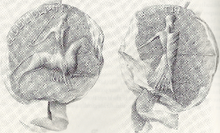Ireland! The English Crown’s first and last colony! The thorn in the Crown?

Illustration of an ancient Irish brooch.
The year of 1171
did not bring Henry a huge amount of fun!
Although the new year of 1171 was one that did not start at all well for Henry, it proved to be a time that was one of the most important of his reign. Beckett’s death had made the great palaces of France and England a little less welcoming than hitherto. At mass, the priest would cast him brief, but intensely resentful glances. During special ceremonies the bishops would huddle together, muttering amongst themselves whilst glaring at him from behind their croziers; then falling strangely and totally silent when he came close, their heads bowed as if deep in prayer.
The atmosphere was oppressive and Henry felt that he had to get away from the miasma of resentment and latent hostility which permeated his royal domains. The master of his vast territories? He felt like a trespasser when dwelling in his many palaces, he simply had to flee!
I simply have to flee! Yes flee!
Can ye not see?
It is elsewhere, anywhere, I must be!
Ironically it was actually the Church which provided him with the perfect avenue with which to do so.
Pope Adrian IV.

The Vatican had long been expressing concern about the state of the Church in Ireland. Pope Adrian, the only English Pope, had wanted Henry to launch a crusade to Ireland way back in 1155. The Pope is said to have sent the young King this papal bull in which he encouraged Henry to go to Ireland.
‘Thou hast signified to us, indeed most beloved son in Christ, that thou’s dost desire to enter into the island of Ireland, in order to subject the people to the laws and to extirpate the vices that have there taken root…’
The young Henry would have been only too happy to comply with the Pope’s wishes but his mother, the formidable Matilda still exerted considerable influence over her son and she effectively vetoed the idea. MUM’S THE WORD! The proposal was shelved.
Then something occurred that put the matter back on the agenda.
In 1166, Dermot MacMurragh had been deposed as king of Leinster by the High King, Rory O’Connor. Dermot fled to the court of Henry II with a view for asking for assistance in regaining his kingdom. At this point Henry was somewhat indifferent to events in Ireland but he allowed Dermot to recruit mercenaries and encouraged his people to aid Dermot. In return for this help, Dermot agreed to swear an oath of loyalty to Henry.
Dermot swears fealty to Henry II.

‘Tis amazing what you can achieve by swearing loyalty to royalty!
At King Henry’s feet I did kneel!
A firm promise, the King and I did seal!
King Henry offered me a very good deal!
Rory O’Connor, with you, I am going to get real!
A number of Welsh-Norman noblemen offered to help Dermot in his endeavour; prominent among these was Richard de Clare, the earl of Pembroke also known as Strongbow. Dermot had offered Strongbow a deal whereby in exchange for his help, Dermot would give his daughter, Aife in marriage to the nobleman and name him his heir as king of Leinster. Strongbow leapt at the offer. In 1170, Dermot and Strongbow had a number of military successes and they had indeed regained control of Leinster. In May 1171 Dermot died, and Strongbow, in a blatant breach of Irish hereditary custom, declared himself King of Leinster.
Seal of Richard de Clare, Strongbow.

Henry, watching events from Normandy, took the view that Strongbow was attempting to establish a rival Norman kingdom in Ireland that could pose a threat to his English realm. The King concluded that it was now time for Ireland to receive it’s first royal visit from the English crown, whose King was actually a Frenchman. Why not, he even had a papal blessing to do so!